According to BrightLocal’s survey[1] 91% of people (test group 18–34 year olds) trust online reviews as much as personal recommendations. So, in 2025, “Can you recommend a good dentist?” is slowly but surely becoming “I’ll find a good dentist online”.
In fact, around 70K people Google “dentists near me” every month, according to Ahrefs data, and convincing even 10% of those people to book a visit to your dental clinic can keep you full for months.
For businesses looking to reach local audiences more effectively, implementing a well-rounded local SEO strategy is essential. By optimizing for location-specific keywords, you can improve your visibility and attract more local customers. Learn more about how local SEO can boost your business.
These are not just vague claims, and in this article, we will outline our comprehensive SEO services for dentists and the strategy we implemented on Denver Dentures to get 241 scheduling forms filled and 73 calls.

Introduction to Dental SEO
Dental SEO, or search engine optimization, is the process of enhancing a dental website’s visibility and ranking on search engines like Google. A well-executed dental SEO strategy can significantly help dental practices attract more patients and increase revenue. By optimizing a website for search engines, dental practices can improve their online presence and draw in new patients.
A comprehensive dental SEO strategy involves several key components: keyword research, content creation, local listing setup, and link building. Keyword research helps identify the terms potential patients are searching for, while content creation ensures that the website provides valuable information that addresses these queries. Setting up local listings, such as a Google Business Profile, makes it easier for local patients to find the practice. Link building, on the other hand, enhances the website’s authority and trustworthiness in the eyes of search engines.
Dental SEO is essential for dental practices to stay ahead and attract new patients. By implementing a robust SEO strategy, dental practices can ensure they are visible to potential patients searching online for dental services.
Why do you need SEO for dentists?
If the numbers above didn’t convince you, let’s look at some of your potential dental clinic competitors who have implemented some of the SEO framework best practices so the benefits of dental SEO marketing for dentists become more clear:
1. Hopatcong dental
A dental clinic in New Jersey had 38.7K organic traffic every month from the approximately 72 keywords they rank for. So, out of 38.7K people who visited their website, if only 10% booked an appointment, they would have 3,870 monthly appointments.

They rank for very valuable and high-intent keywords such as “emergency dental clinic New Jersey” and “nj dentist” since the people searching for these terms show high intent of conversion (in this case, they are 100% ready to schedule an appointment). This helps them appear prominently on the search engine results page, increasing their visibility and attracting more patients.

2. Morris Town Family Dental
Another New Jersey dental clinic is starting to increase its organic search traffic by ranking for 792 relevant keywords.

Besides commercial keywords, their websites cover educational keywords such as “ what is the goal of preventive dentistry?” and “electric toothbrush recommended by dentists”.
They use various online tools to analyze keyword performance and optimize their content. We will cover why these keywords are important later on, but, in a nutshell, they educate the readers who need more convincing and position your website as an authority in the niche.

3. NYC Dent
In a highly competitive area such as New York, dentist SEO can be one of the differentiating factors that help you stand out from your competition.
This New York-based dental clinic decided to invest in its dental SEO game, which resulted in 848 keywords and 2.5K organic traffic. Plus the numerous bookings and calls we can’t see.

An important part of their strategy is their continuous dental SEO efforts, which include ranking for every possible high-intent keyword variation, even as specific as “nyc dental of upper east”. These are the best seo keywords for dentists.

Their backlink strategy is also fruitful since they have backlinks from reputable and highly relevant listicles that put their business name and link, such as this one:
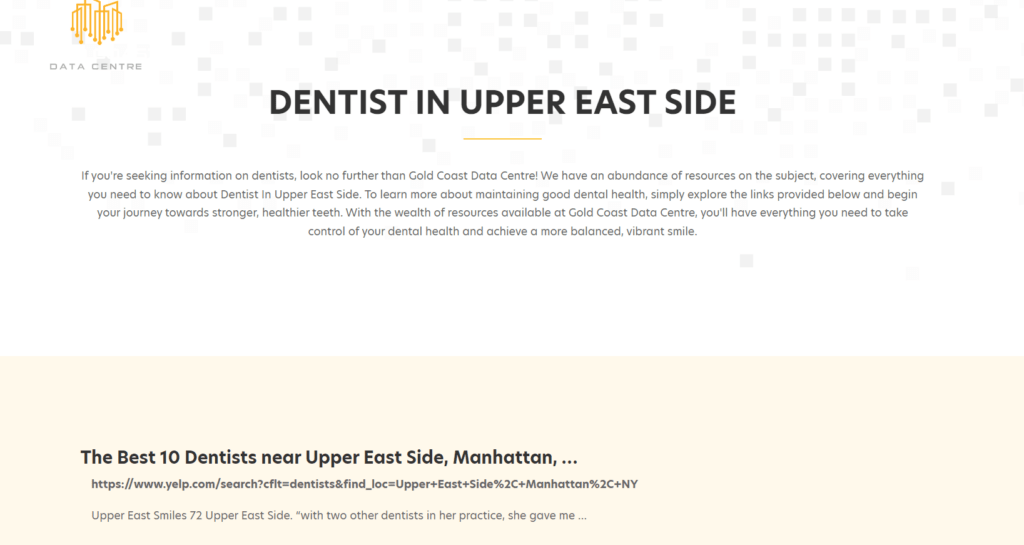
To sum up, SEO for dentists is necessary to:
- Stand out from the competition in your area
- Get highly relevant leads easily
- Boost brand awareness and authority
- Build trust with potential customers
If you don’t know where to start, we will outline our specialized SEO tips for dentists, which will get you ahead of your competition as soon as you implement them.
Understanding Search Engines
Search engines like Google use complex algorithms to rank websites in search results. These algorithms consider various factors, including keyword usage, content quality, and user experience, to determine the relevance and usefulness of a website.
Understanding how search engines work is crucial for developing an effective dental SEO strategy. Search engines aim to provide users with the most relevant and useful search results, which means dental practices need to optimize their websites to meet these criteria. This involves using relevant keywords naturally within the content, ensuring the website is user-friendly, and providing high-quality, informative content.
By optimizing their website and online presence, dental practices can improve their search engine rankings. Higher rankings mean better visibility on search engine results pages, which can lead to increased traffic and more potential patients. A well-optimized website not only attracts more visitors but also enhances the overall user experience, making it easier for patients to find the information they need and book appointments.
A Proven Dentist SEO Strategy in 8 Steps
The strategy we will outline below is highly inspired by our Denver Dentures case study. Make sure to read and follow the steps below if you want to attract more patients online for your dental clinic.
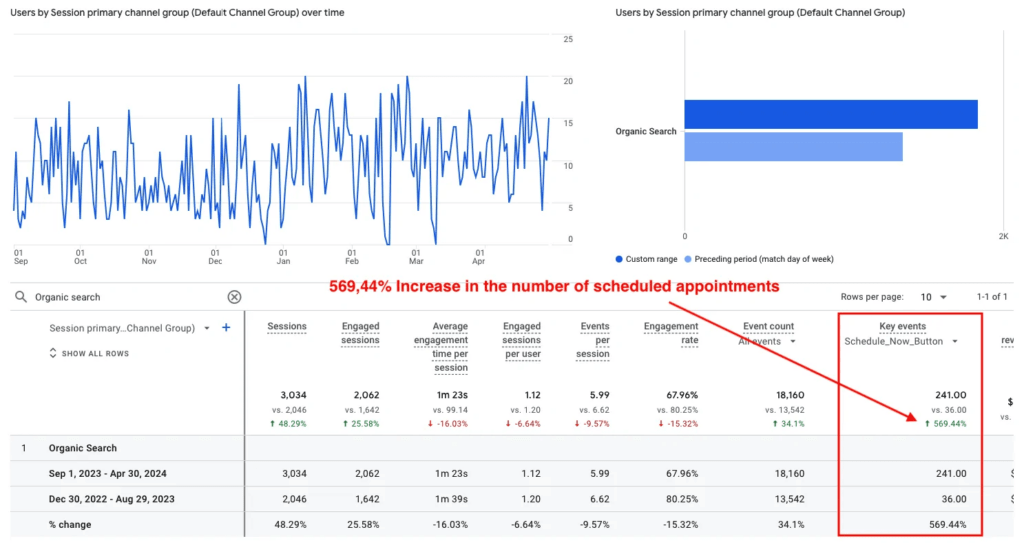
1. Do Local & Broad Keyword Research
If you are just starting off your dental search engine optimization strategy, the #1 piece of advice is to try to rank for local and high-intent keywords. Those keywords have either a service (dental implants, teeth whitening) or location (near me, city name) in them.
If the search volume is high and the keyword difficulty is low, there is a high chance you can easily rank in these SERPS, with proper optimization. What makes these keywords the most valuable is the intent behind them — patients are Googling with the intent to book an appointment
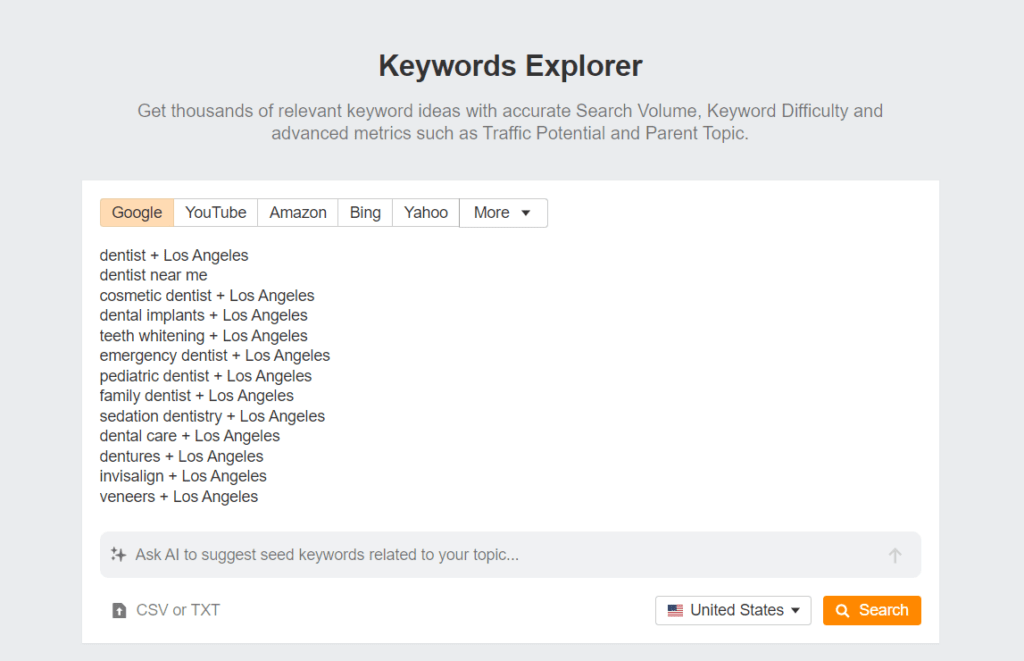
If there are no metrics for the proposed keywords, make sure to check competitor keywords or matching phrases to see what exactly people are searching for in your area. Sometimes, even the slightest keyword variations can show different metrics.
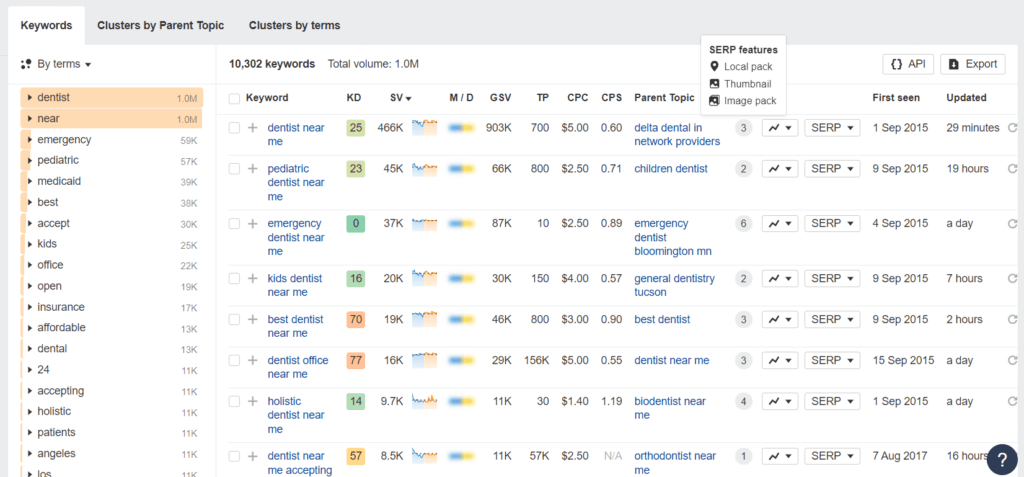
For example, these are the five keywords that had the best metrics in Denver, so for Denver Dentures, we aimed to target them initially. As part of our local seo for dentists strategy, we managed to rank their site for 32 local keywords in the top 10 positions in total (six of these ranked in the top position).
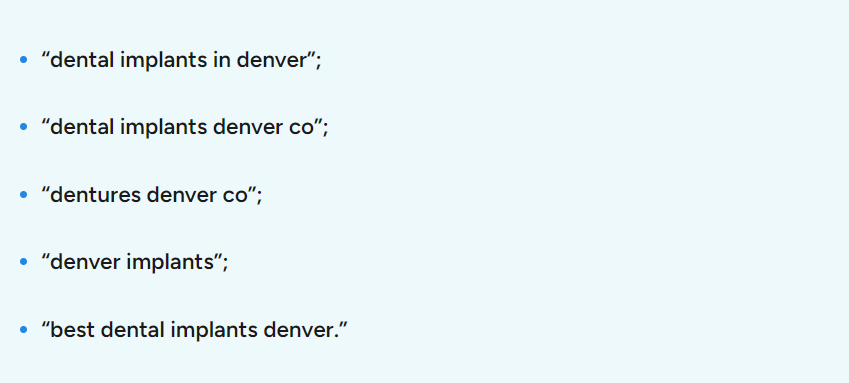
Where do local keywords appear? In three places.
- You can appear at the very top (sponsored section) if you run Google ads campaigns.
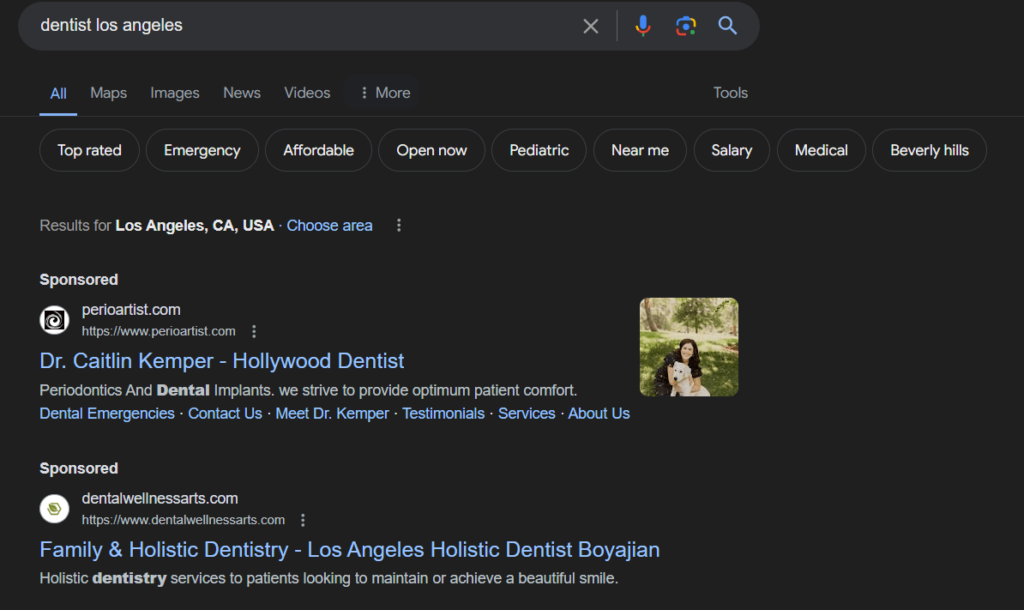
2. You can appear in the “ Places” section, also called the local pack, if you have an optimized Google My Business profile.
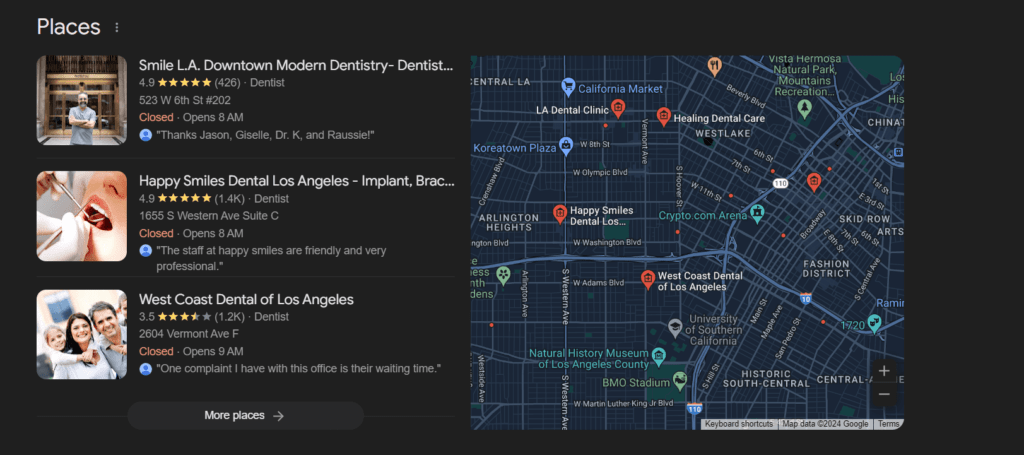
** A hidden gem is having an account on Apple Maps as well, so your clinic appears there too.
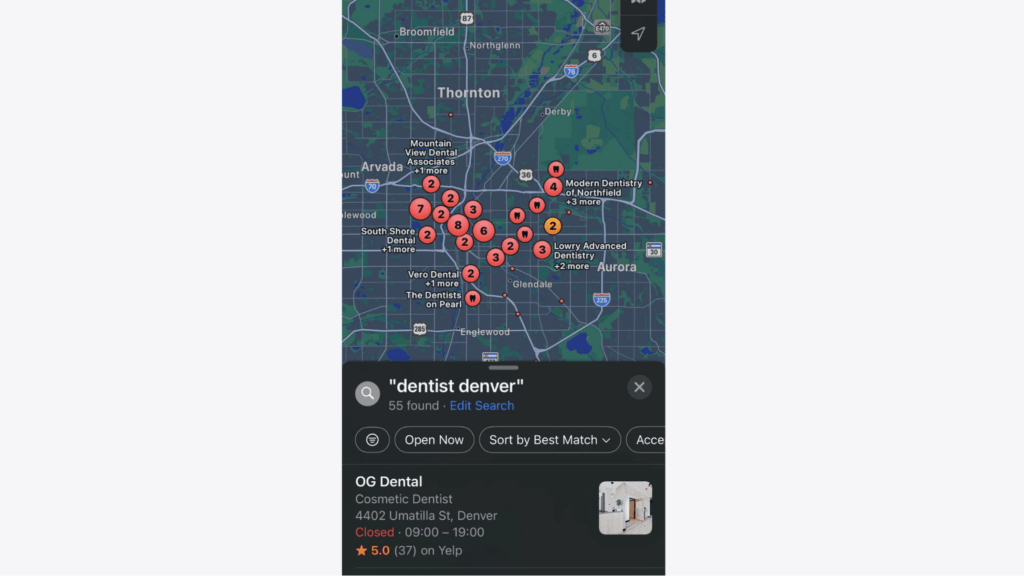
3. Finally you can appear in the “ traditional SERP” if your service page, listicle, or blog post is targeting the keyword.
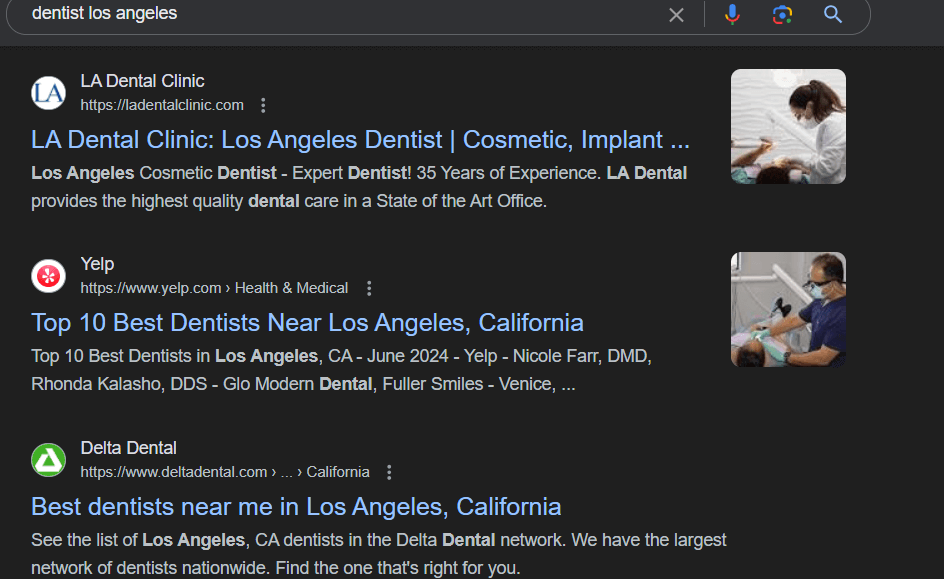
As for broad keyword research, once you have the local keyword strategy in place, you can move on to less comercial keywords.
These keywords are usually used for creating longer blog posts where you educate the reader ansd subtly promote your service by sharing your expertise and linking your service page. Make sure these keywords are highly relevant to your clinic and audience.
They can range from “Is teeth whitening safe?” to “ How many good dental clinics are there in Denver?”.
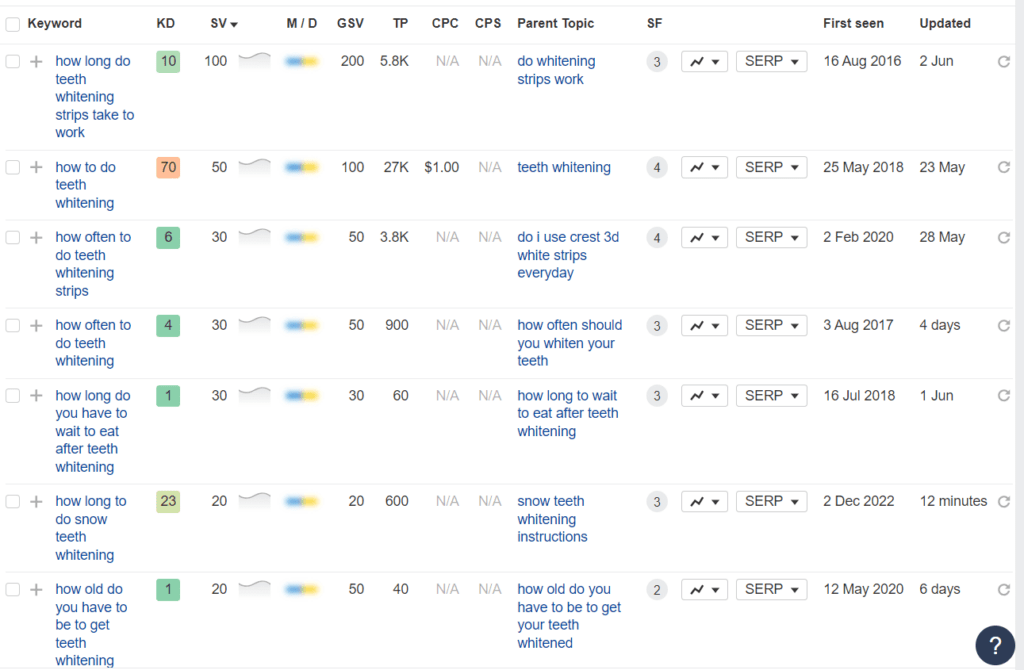
2. Perform Competition Analysis
To get more keyword and backlink ideas that are relevant to your target audience (patients), you can take a look at what works well for your competitors. No matter where they are based, their keywords can be used for your benefit.
You can use Ahrefs “Site Explorer” to see what keywords they rank for and what backlinks they get. Even better you can use their “ Competitive Analysis” tool to find out some keyword gaps that you can fill.
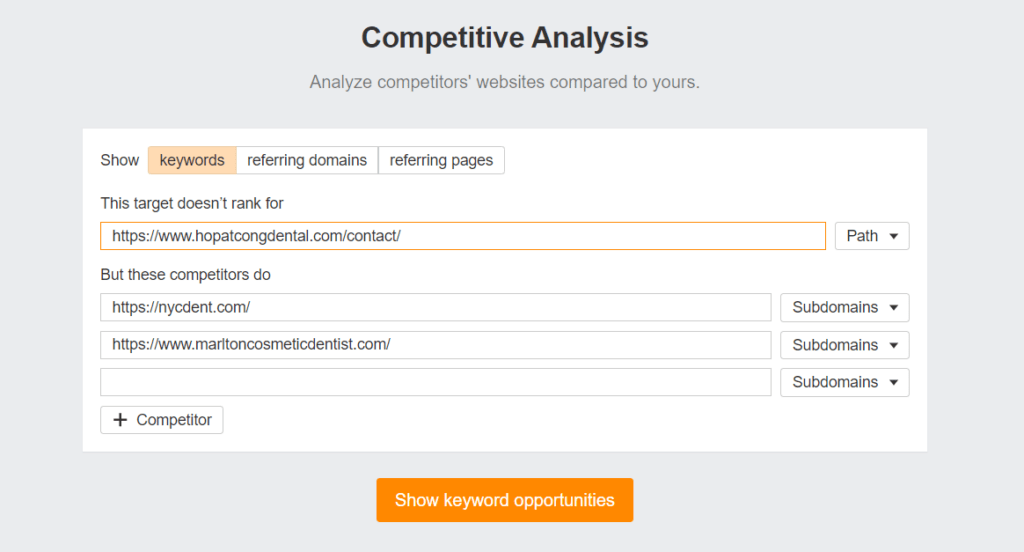
>> Learn more about or keyword research services<<
Another powerful tool for boosting your online presence is leveraging paid social campaigns. Partnering with a Facebook ads agency can help you target specific audiences and achieve measurable results.
3. Build Service Pages & Blog
Service pages (a separate page for each service your dental clinic offers) are important for both keyword ranking and internal link building, as well as optimizing individual web pages. These pages will target multiple keywords, which can be inserted throughout the segments of the page.

The most important segments you should cover are:
- About section
- Results and testimonials
- Pricing
- Frequently Asked Question
Plus, a CTA that is clearly displayed everywhere, so patients can book an appointment at any time.
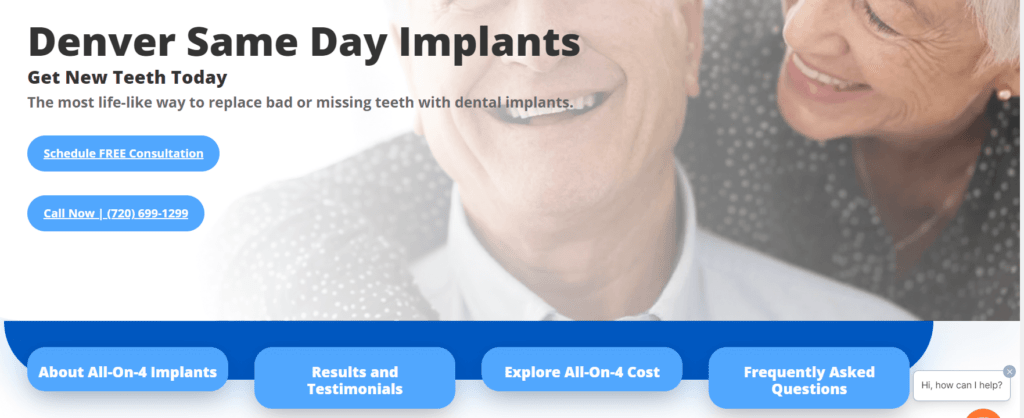
Blog, Reviews & Bios
For the broader keywords we mentioned above, it is best to build a blog page with in-depth articles on procedures, best practices and FAQs. These articles will cover educational keywords that will help potential customers learn more about the service.
You can link to the appropriate service page and other articles so that the customer can easily continue to browse your website. But remember to stick a CTA to the article so that warm-up leads can book directly.
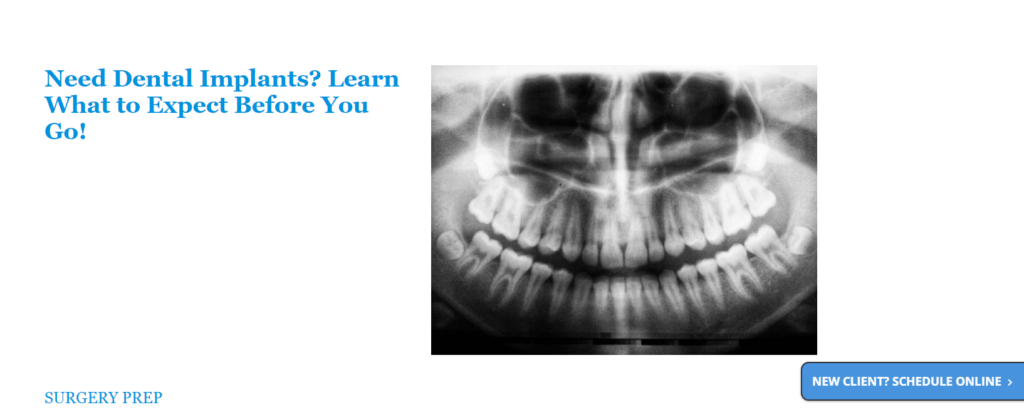
Apart from blog articles, reviews and bios are a great way to show EEAT (Experience, Expertise, Authority, Trustworthiness). Since Google considers EEAT as one of the most important ranking factors now, make sure to follow these tips.
For reviews, you should display your own patient reviews on your website and other websites as well. We will talk about other websites in the backlink part of this article, and here is an example of how you can display them on yours:
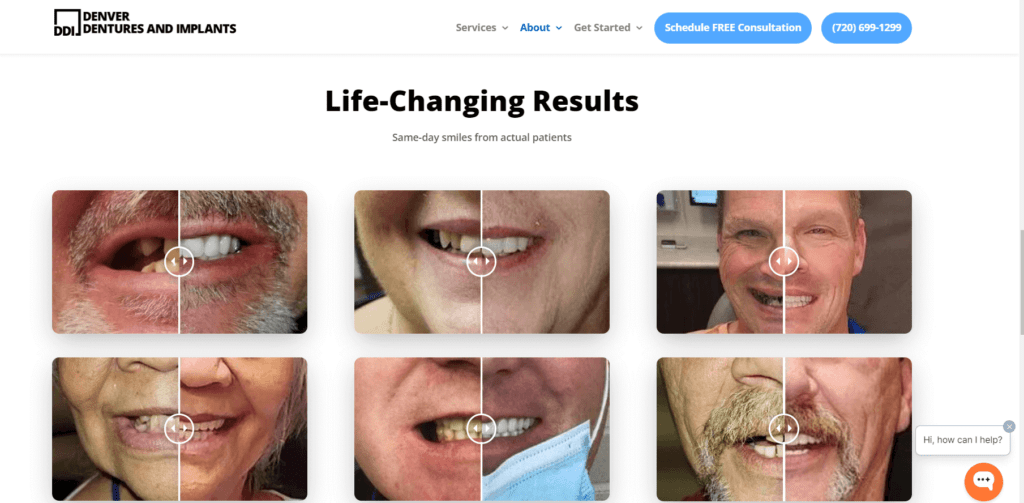

Finally, doctor bios on your website build trust and promote expertise in your niche. Here is an example of how you can proudly display yours:
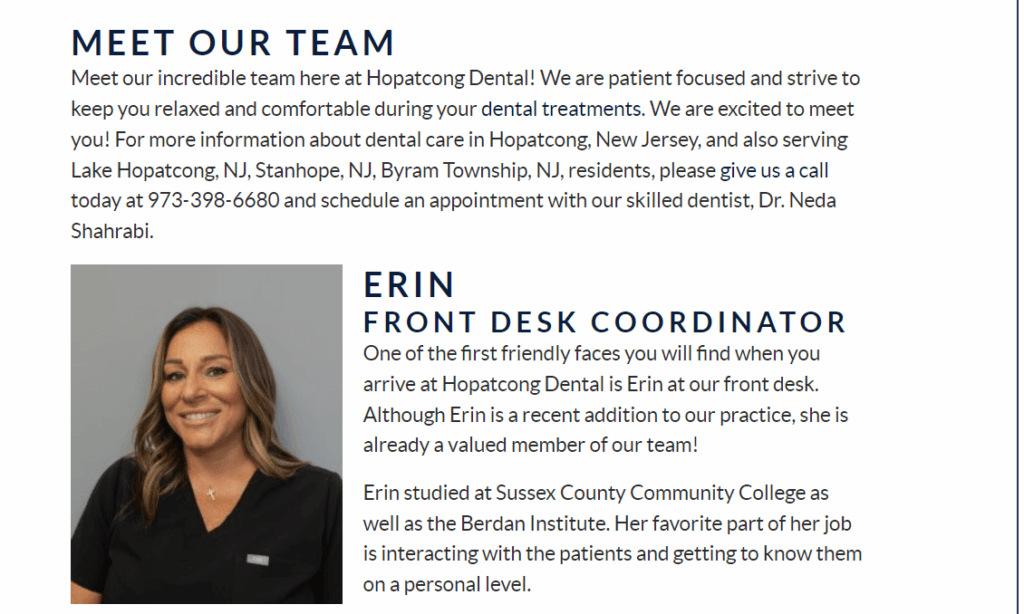
4. Website Navigation & CALL/Book Now CTAs
Once you have attracted potential leads to your website, the worst that could happen is for them to bounce (leave your website). That is why your website navigation and CTAs need to be polished.
As for website navigation, both your patient and Google like it when they can smoothly move and go back on your website, which is why a well-organized website structure is essential. Folders and subfolders are very effective when it comes to easily finding what you need on a website.

Make sure your CTAs are clear and present in every step where the patient might want to book an appointement.
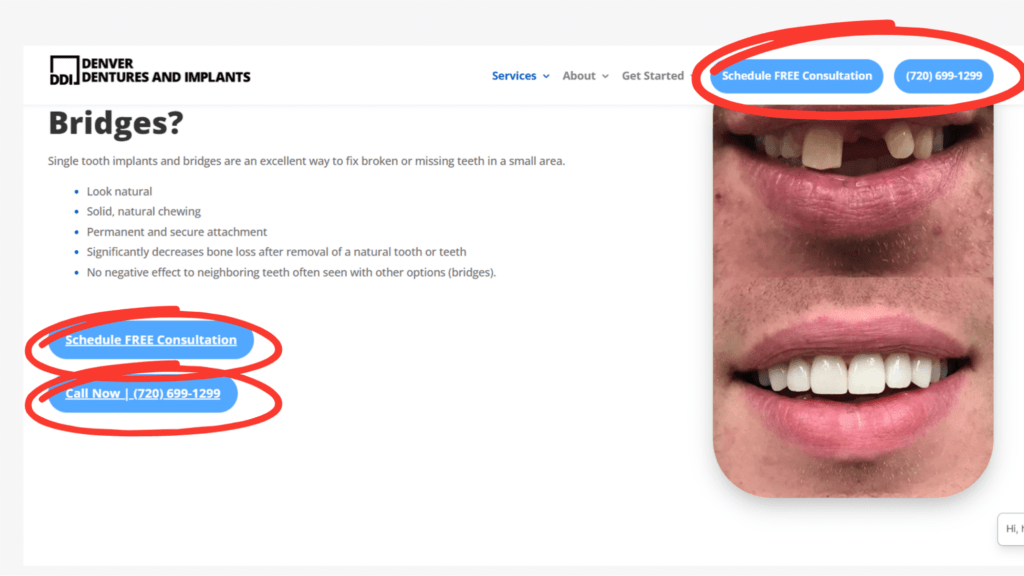
5. Google Business Profile
Having a Google Business Profile help patients find you easily when they search locally. They can also take a quick glance at your services, operating hours, precise locations and reviews.
Make sure everything is up to date so that patients can book an appointment via “Places”. Here is how to sign up for a Business Profile on Google.
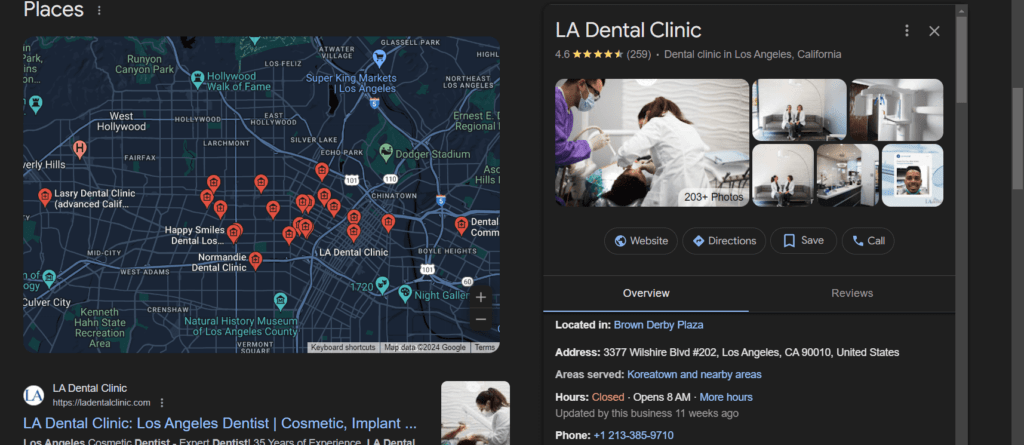
6. Link Building
Link building helps you expose your dental clinic to other target audiences and boosts your authority in the eyes of Google. Since link building is one of the ranking factors, it is worth the investment.
However, if you don’t have a big budget, here is how you can secure relevant backlinks.
First, you can guest post, which is, in a nutshell, writing an article for another blog and getting a backlink to your website in return. Just Google “dental guest post opportunities”, and you can find lots of blogs that accept guest posting.
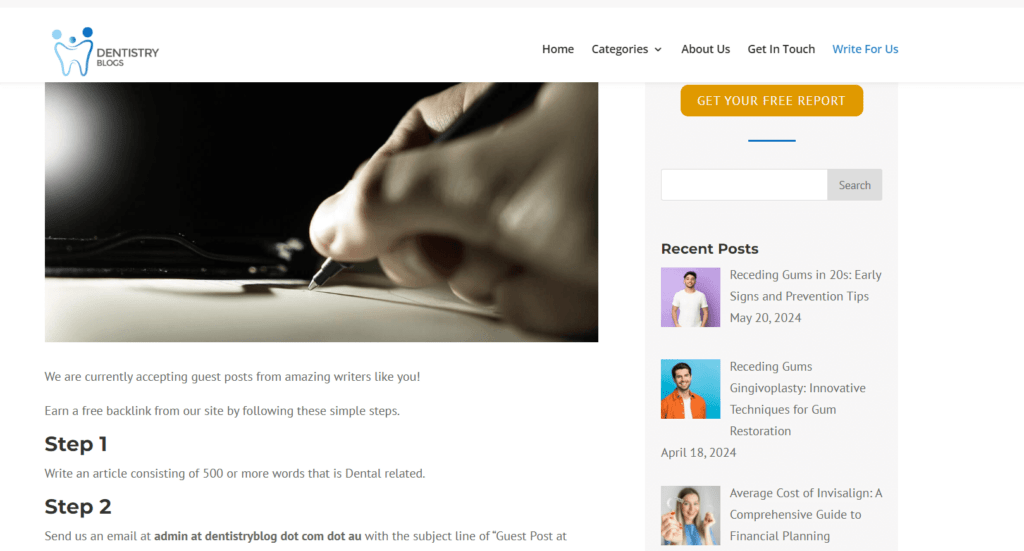
Also, make sure to appear on popular dentist review sites, such as:
- Healthgrades
- Vitals
- RateMDs
- Yahoo Local
- Doctor.com
- Zocdoc
- Yelp
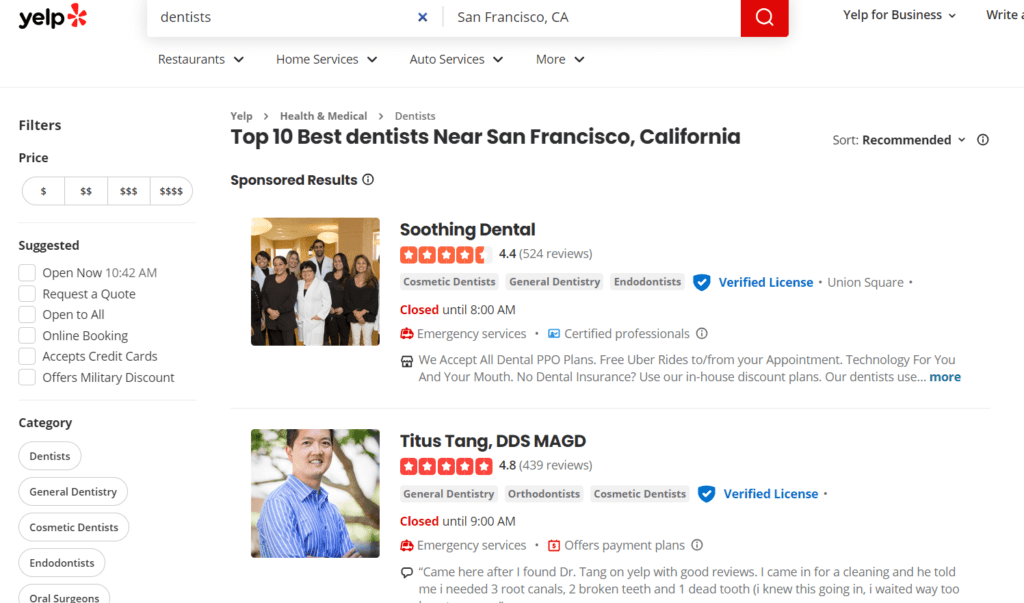
But, don’t forget specific local review sites as well:
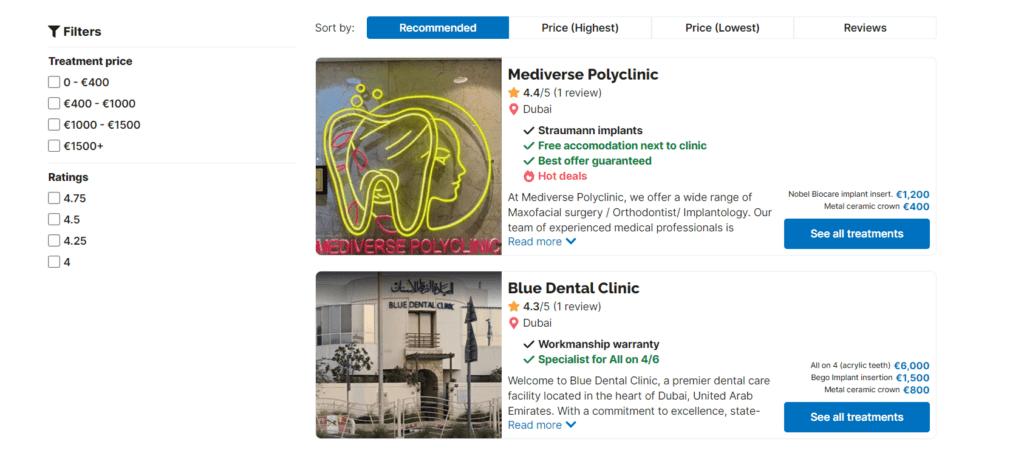
Also, there are specific dental directories that you want to appear on:
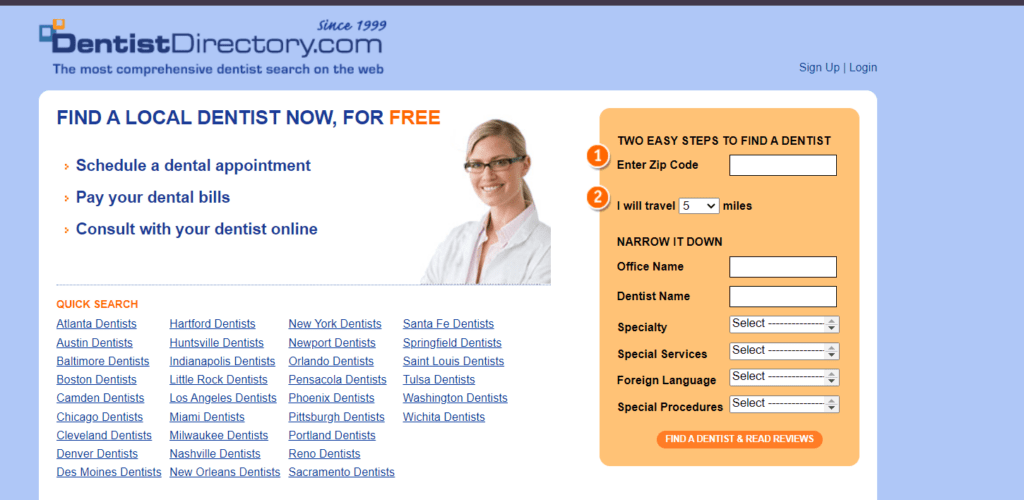
The final place to track brand mentions and build organic links is through social media. Quora is a great place to subtly promote your services and clinic by answering questions and solving patient dilemmas.
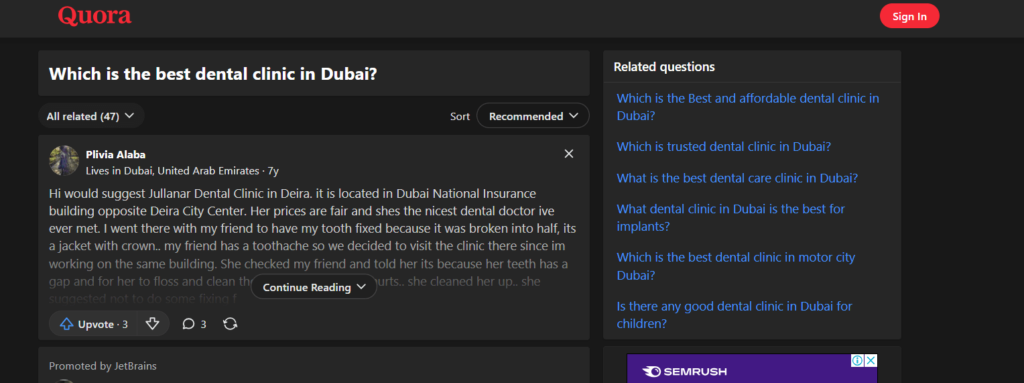
7. On-Page SEO & Technical SEO
On-page SEO is the process of optimizing a single webpage so that it has a higher chance of ranking in the SERP’s top positions. Technical SEO services focus on optimizing the infrastructure of the website, often requiring the expertise of a web developer to ensure it is easier for bots to crawl and index your page. Understanding the differences between technical SEO vs content SEO is crucial as both play vital roles in your overall strategy.
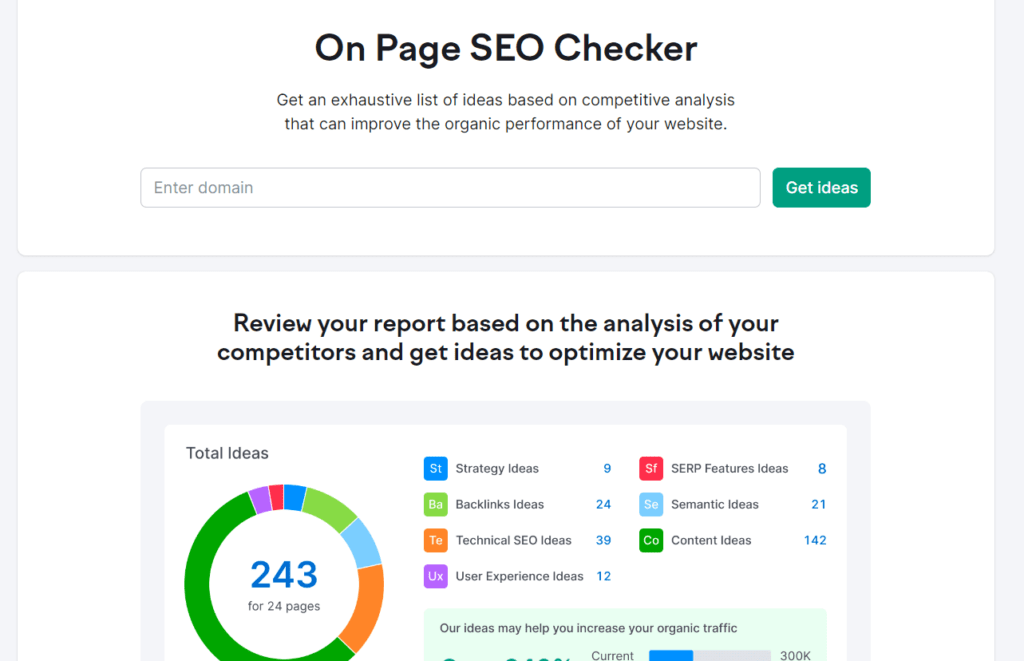
You can do it with a tool, but here is your quick checklist for on-page & technical optimization:
- Incorporate primary and secondary keywords naturally in your content, headings, Alt tags, metadata and URL slug
- Use semantic HTML
- Use relevant internal links to articles or/and service pages
- Apply schema markups
- Index your page
- Increase page speed
- Optimize for mobile friendliness
>> Learn more about of off page SEO services<<
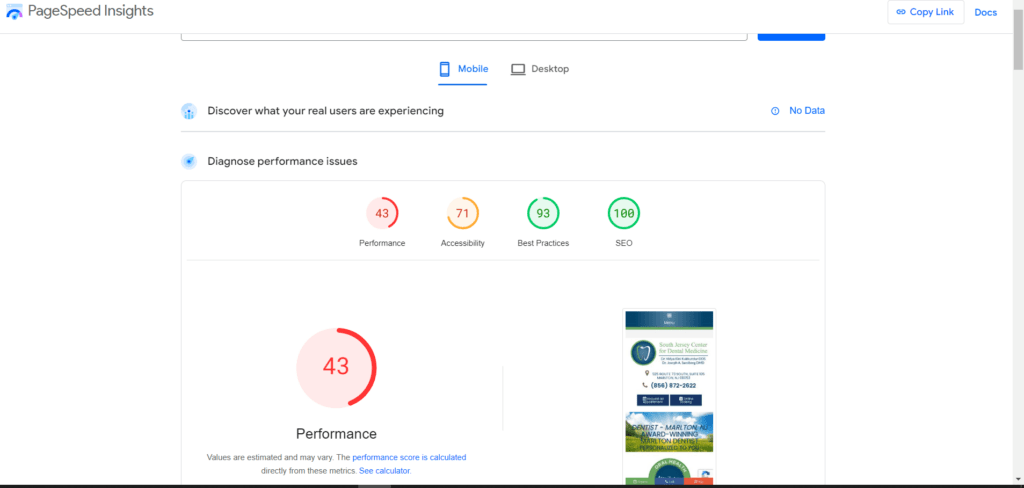
8. Structured Data
Structured data or schema markups reveal more than the average search engine results, and a dental SEO specialist can help implement these effectively. For example, here we have five-star ratings (they’ve used a schema markup to display it).
With schema markups showing your rating, hours of operation, number or street address, you not only stand out from the crowd in the SERP but also make it easier for the viewer to reach out to your dental business.

Mobile Optimization for Dental Websites
Mobile optimization is critical for dental websites, as most patients use mobile devices to search for dental services. A mobile-friendly website can significantly improve user experience and increase conversions. Mobile optimization involves ensuring that a website is responsive, fast, and easy to navigate on mobile devices.
Google prioritizes mobile-friendly websites in search results, making mobile optimization essential for dental SEO. A responsive design ensures that the website adapts to different screen sizes, providing a seamless experience for users on smartphones and tablets. Fast loading times are also crucial, as slow websites can frustrate users and lead to higher bounce rates.
A well-optimized mobile website can improve a dental practice’s online visibility and attract more patients. By focusing on mobile optimization, dental practices can ensure they meet the needs of patients who are searching for dental services on the go, ultimately leading to increased appointments and revenue.
Cosmetic Dentistry and SEO
Cosmetic dentistry is a highly competitive field, and SEO can help practices stand out. A well-executed SEO strategy can improve a cosmetic dentistry practice’s online visibility and attract more patients. By optimizing their website and online presence for keywords like “dental implants” and “teeth whitening,” cosmetic dentistry practices can reach potential patients searching for these services.
High-quality content and patient reviews are also crucial for improving a cosmetic dentistry practice’s search engine rankings. Informative blog posts, detailed service pages, and positive patient testimonials can enhance the website’s authority and trustworthiness. A strong SEO strategy can help cosmetic dentistry practices attract more patients and increase revenue by ensuring they appear prominently in search engine results.
In a competitive industry like cosmetic dentistry, having a robust SEO strategy is essential for standing out and attracting new patients. By focusing on relevant keywords, creating valuable content, and leveraging patient reviews, cosmetic dentistry practices can improve their online presence and grow their patient base.
How To Measure the Impact of Your Dentist SEO Strategy
You’ve implemented some of our SEO best practices for your dental business, and what now? Without measuring the results, all your efforts and resources may go down the drain.
Here are the main KPIs you need to track using tools like Google Analytics:
- Conversions
- Keyword rankings
- Traffic
- Clicks
- Links built
Conversions
In GA4, you can set up an event and track your conversions to measure the success of your SEO campaign. An event can be every time someone clicks on a CTA (booked an appointment, filled out a form, or called you directly from the website). Since the end goal is having more appointments and paying customers, this is the #1 metric to track.
GA4 can also help see your customer demographics and behavior as well as what they react to on your website, so you can double down or optimize your SEO strategy based on real data.

Keyword Rankings
You can see how many keywords you are ranking for in keyword tracking tools such as Ahrefs. The more keywords you rank for, the more SERPs you appear in, which will lead to more exposure and potential traffic. You should monitor your ranking positions as well, since being closer to the number one position means more traffic and potential leads.

Traffic & Clicks
In Google Search Console, you can view your total number of impressions (the people who saw your webpage on the search engine result page). The more keywords you rank for (and the higher their positions are), the more traffic (impressions) you will have.
Clicks refer to the number of people who clicked on your webpage once they saw it in the SERP. Every click is a potential lead, so measuring those is very important when tracking conversions. To attract more clicks your webpage needs to answer the search intent and attract the viewer with a proper title.
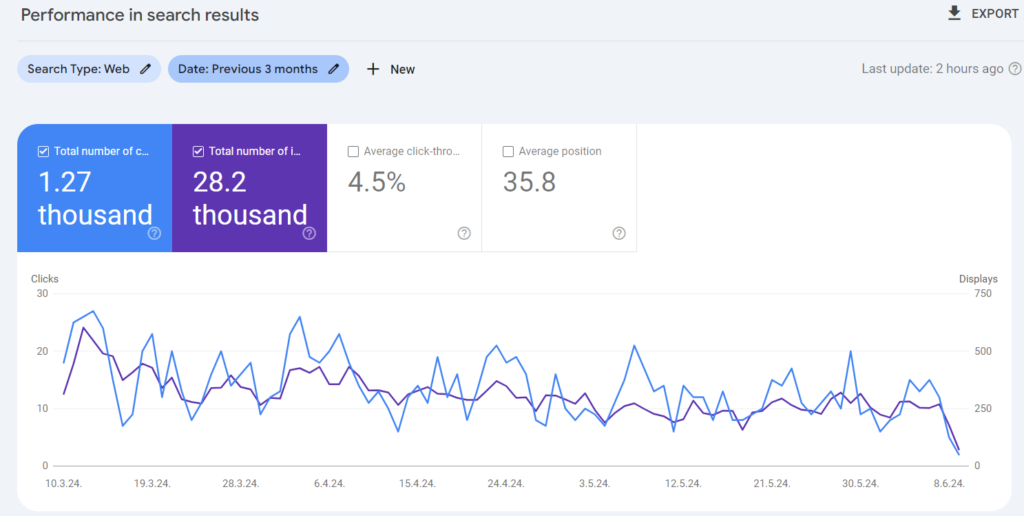
Links Built
One final thing to track is the links you built over a period of time. The more backlinks you have, the more authority you possess in front of Google. However, Google also “measures” the quality of your backlinks, so make sure to filter and delete spam links while boosting organic link building.
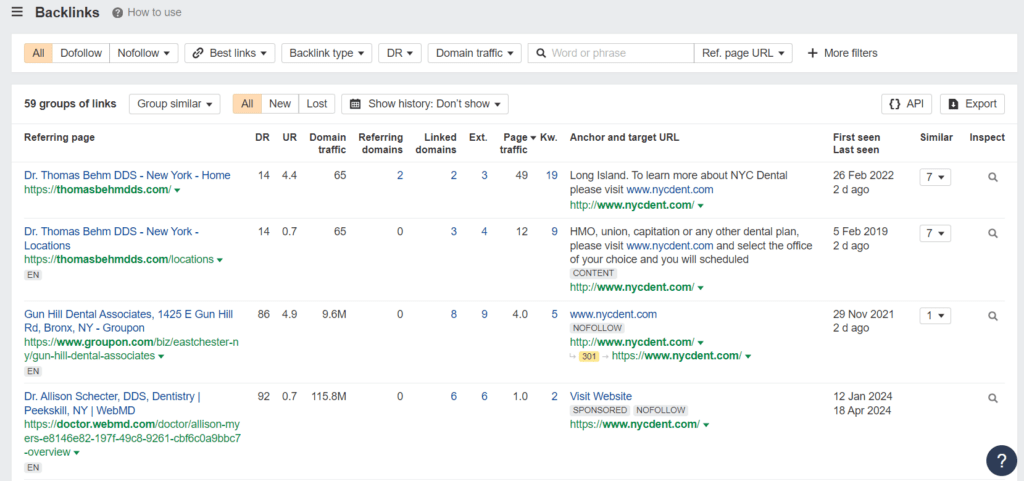
Patient Engagement
Patient engagement is critical for dental practices, and SEO can play a significant role in improving it. A well-optimized website can provide patients with valuable information and enhance their overall experience. By targeting keywords like “patient reviews” and “dental testimonials,” dental practices can attract more patients and build trust.
Patient reviews and testimonials are powerful tools for improving a dental practice’s online reputation. Positive reviews can influence potential patients’ decisions and encourage them to book appointments. By showcasing patient testimonials on their website and other online platforms, dental practices can demonstrate their expertise and build credibility.
A strong SEO strategy can help dental practices improve patient engagement and attract more patients. By providing valuable content, optimizing for relevant keywords, and leveraging patient reviews, dental practices can enhance their online presence and foster stronger relationships with their patients.
Why Hire A Specialized SEO Agency for Dentists?
In this article, we’ve outlined a proven SEO strategy for dental clinics. But with Google every ever-changing algorithms and tough competition, some tweaks need to be made to outrank your competitors and have great ROI.
With a specialized SEO Agency with dental SEO services, such as NUOPTIMA, you just have to focus on managing booked appointments from your online audience while an SEO professional handles all aspects of online marketing.
We have the expertise and the tools that help us achieve consistent results and adapt strategies based on trends and algorithm changes.
With regular monitoring and reports, you will know exactly where each penny goes while we work on your online presence and ROI.
Here are just a few of the dental SEO services we provide to help improve your dental search terms and rankings:
- Arrange the placement of links on reputable medical and dental websites.
- Create SEO-optimised content to help your website rank for more keywords on Google.
- Optimize existing pages to comply with Google’s rules and best practices.
- Create all the necessary pages and conduct keyword research to help your website collect as much organic traffic as possible.
You can read more about our action plan that got a dental clinic 241 scheduling forms filled in this Denver Dentures case study.
Just like the dental industry, SaaS businesses also benefit from highly specialized PR strategies to help them stand out. If you’re in the SaaS sector, you can explore how a dedicated SaaS PR agency can elevate your brand visibility and drive targeted engagement.
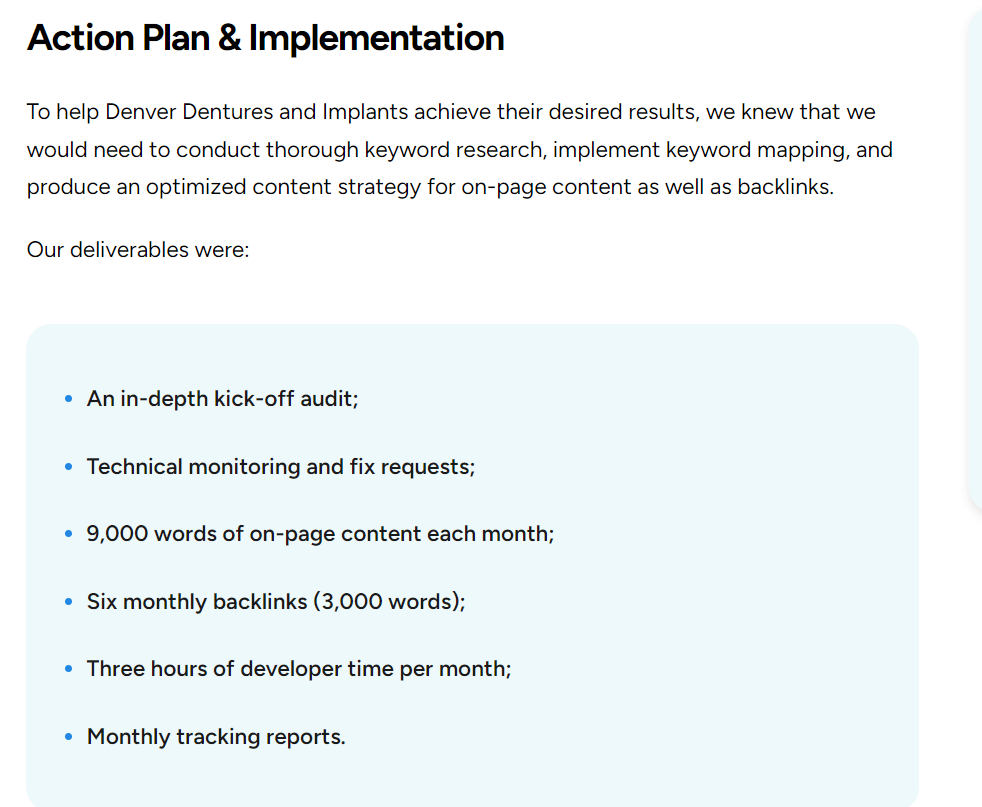
Conclusion
This article how shared practical tips and best practices when it comes to SEO for dentists. By implementing these steps and suggestions, you can attract more patients online and stand out in a highly competitive industry.
With the steps and the tools we listed above, you could do it on your own, without the help of a dental SEO expert. However, if you don’t want SEO to be your most consuming daily task and a potential shot in the dark, you can always contact our SEO agency.
We work with 100+ businesses. Book a slot now to talk to one of our experts.
FAQ
Project-based SEO campaigns for dental practices can cost anywhere from $2,000 to $7,000 or more per month, depending on the scope and complexity of the project and the website. Book a call with NUOPTIMA, and we will find strategies that fit your budget and goals.
By optimizing their website for search engines, dentists can improve their search engine rankings, making it easier for patients to find them online. Don’t let your competition drive away potential clients just because they have online reviews and appear at the top of the SERP.
In a nutshell use a proven approach to SEO for dentists, focusing on keyword research, content creation, and link building. We also optimize existing pages and create new ones to attract as much organic traffic as possible. With past experience and knowledge of trends, we know what works and can easily adapt.
Calculate the ROI by dividing the revenue generated by SEO efforts by the cost of those efforts. The most important metrics to track are CTA clicks (conversions), traffic, clicks, and keyword ranking positions.
Any dental practice can benefit from SEO, but it’s especially valuable for those in competitive urban areas, multi-location practices, or clinics offering high-value services like implants or cosmetic dentistry. SEO helps these practices appear in front of potential patients actively searching for dental care online.
While timelines can vary, most dental practices start seeing noticeable improvements in rankings and traffic within 3 to 6 months. More competitive markets or newly launched websites may take longer. Consistency in content, local SEO, and link building is key to sustainable growth.
Patients typically search for dentists near them, making local SEO crucial. It ensures your practice appears in Google’s local pack, on Google Maps, and in location-based searches. This involves optimizing your Google Business Profile, building local citations, and gathering patient reviews.



